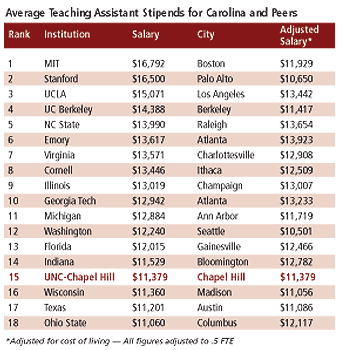

A publication of The Graduate School, University of North Carolina at Chapel Hill
On-Line Version Spring 2003
Home | Back issues | About us | The Graduate School | UNC-Chapel Hill | Make a gift

 |
Talking Research Ethics
In the current atmosphere of commercially funded research, scientists
must be ready to face the difficult ethical questions that arise when
profit-seeking corporations and universities collaborate.
That was the message Nancy
Olivieri delivered at the Ralph R. Landes and Annual Research Ethics Lecture
on January 29. The lecture was sponsored by the UNC School of Medicine,
the Graduate School and the John B. Graham Student Research Society.
The University of Toronto professor
of pediatrics and medicine described her battle against Apotex, a drug
company that sought to silence Olivieri’s concerns about patient
safety during clinical trials for the drug deferiprone, and later sued
when she made her research public.
Olivieri outlined the pitfalls
and risks to scientific integrity and academic freedom posed by corporate-funded
research, citing numerous instances when corporations forced researchers
to keep negative, confounding or “boring” results to themselves.
She said those who spoke out did so at their peril and, often, without
the support of their universities.
Examining T.A. Pay
UNC’s teaching assistant
pay ranks 15th in a list of 18 peer institutions, a fact that led the
Teaching Assistant Advisory Task Force to recommend increases in 2004.
To compete with private and public universities in graduate student recruitment,
the task force said, UNC’s pay should rank in the top quarter.
Implementing the recommendations
would cost the University $5.5 million and would depend upon the availability
of funding. In a January report, the task force said the goal is ambitious,
but worthwhile. Steve Allred, task force chair and associate provost for
academic initiatives, said, “In order to attract the best graduate
students and to provide a reasonable level of compensation for our T.A.s,
and to reach our goal of being the leading public university, we can do
no less.”
Teaching in the U.S.A.
Teaching in the United States
can be a perplexing experience for a graduate student from another country.
“In some Asian countries, for example, prolonged eye contact is considered
rude,” said Amy Johnson, instructor for a Graduate School pilot course
offered for international teaching assistants this school year. Some countries
also use a different style of instruction — all lecture and no questions
asked.
Johnson’s course, “Communicating in the American Classroom,” helps students with English pronunciation, teaching skills and cultural differences in the classroom. Before and after videos of simulated lectures showed marked improvement in students’ abilities, Johnson said. “They do feel much more confident as teachers and as communicators,” she said.
The Graduate School developed the pilot course with the help of the Parents Council, the College of Arts and Sciences and the Center for Teaching and Learning.
Campaign Notes
Generous gifts from our supporters
have enabled the Graduate School to raise nearly $9 million of our $18
million goal for the Carolina First Campaign. Graduate School initiatives
that will benefit include Dissertation and University Fellowships within
the Royster Society of Fellows, the Scholars for Tomorrow Fellows, the
Graduate Student Opportunity Fund and the Dean’s Discretionary Fund.
The University entered the public phase of the Carolina First Campaign on Oct. 11, 2002, with the goal of raising $1.8 billion. As of Feb. 24, the University had raised more than $940 million, 52 percent of its goal.
© 2002, The Graduate School, The University of
North Carolina at Chapel Hill
All text and images are property of The Graduate School
at the University of North Carolina-Chapel Hill. Contact Sandra Hoeflich
at shoeflic@email.unc.edu
to request permission for reproduction.